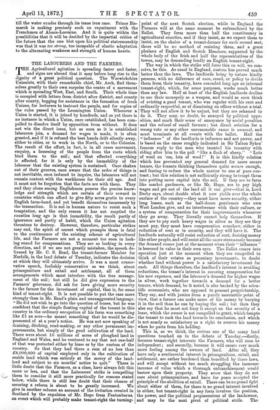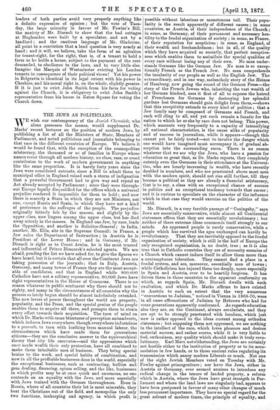THE LABOURERS AND THE FARMERS.
THE Agricultural agitation is spreading faster and faster, and signs are abroad that it may before long rise to the dignity of a great political question. The Warwickshire
Unionists, with their remarkable chief, Mr. Arch, find them- selves greatly to their own surprise the centre of a movement which is spreading West, East, and South. Their whole time is occupied with letters from district after district, and county after county, begging for assistance in the formation of fresh
Unions; for lecturers to instruct the people, and for copies of
the rules passed by the Leamington Union. Wherever a Union is started, it is joined by hundreds, and as yet there is no instance in which a Union, once established, has been com- pelled to dissolve itself by spposition from without. It does not win the direct issue, but as soon as it is established labourers join, a demand for wages is made, it is often granted, and if it is refused the best hands drift silently away, either to cities, or to work in the North, or to the Colonies. The result of the effort, in fact, is in all cases movement, enquiry, a loosening of the people from the roots which bind them to the soil ; and that effected everything is effected, for it is only by the immobility of the labourer that the existing system is sustained. Once shaken out of their grooves, once aware that the order of things is not inevitable, once induced to inquire, the labourers will not remain content with the workhouse for their old age. And it must not be forgotten that the facts are with them. They and they alone among Englishmen possess the precise know- ledge and stiength which are certain of their reward in countries which can afford to give fifty acres gratis to every English farm-hand, and yet benefit themselves immensely by the transaction. It is not in human nature to resist such a temptation, and the only reason it has not emptied the counties long ago is that immobility, the result partly of ignorance and partly of habit, which the Union agitation threatens to destroy. However, therefore, particular strikes may end, the spirit of unrest which prompts them is fatal to the continuance of the existing scheme of agricultural life, and the Farmers are not a moment too soon in look- ing round for compensations. They are so looking in every direction, and if we are not greatly mistaken, the speech de- livered by Mr. 0. S. Read, the tenant-farmer Member for Norfolk, in the land debate of Tuesday, indicates the decision at which they will ultimately arrive. It was a most conser- vative speech, foolishly conservative as we think, about primogeniture and entail and settlement, all of them arrangements which must interfere with the free manage- ment of the soil ; but still he did give expression to the Farmers' grievance, did ask for laws giving more security to the farmer for the investment of capital, that is, for some kind of tenant-right. It is not possible to put the case more strongly than in Mr. Read's plain and unexaggerated language. "He did not wish to go into the question of leases, but he was confident that the simple floating capital of the tenant in this country in the ordinary occupation of his farm was something like £1 an acre—he meant something that he would be dis- possessed of at a year's notice. He was not now speaking of draining, ditching, road-making, or any other permanent im- provements, but simply of the good cultivation of the land.
There were about 16 millions of acres of ploughed land in England and Wales, and he ventured to say that not one-half of that was protected either by lease or by the custom of the country. So that they had there a sum of no less than £8,000,000 of capital employed only in the cultivation of arable land which was entirely at the mercy of the land- lord and subject to six months' notice to quit." There is little doubt that the Farmers, as a class, have always felt this more or less, and that the Labourers' strike is compelling
them to consider it still more practically for reasons stated below, while there is still less doubt that their chance of securing a reform is about to be greatly increased. We give in another column an account of the irritation created in Scotland by the expulsion of Mr. Hope from Fentonbarns, an event which will probably make tenant-right the turning-
point of the next Scotch election, while in England the Farmers will at the same moment be enfranchised by the Ballot. They form more than half the constituency in agricultural counties, and if they insist, as we expect them to insist, on the choice of a tenant-farmer for each second seat, there will be no method of resisting them, and a great phalanx of English and Scotch Members, supported by the whole body of the Irish and half the representatives of the towns, may be demanding loudly an English tenant-right.
The way in which the strike will force this on will, we con- ceive, be this. As usual in England, custom has proved much better than the laws. The landlords being by nature kindly persons, with no difference of race, creed, or policy to divide them from their tenantry, have conceded long ago an informal tenant-right, which, for some purposes, works much better than any law. Half at least of the English landlords decline to use their monopoly as a weapon, and would as soon think of evicting a good tenant, who was regular with his rent and ordinarily respectful, as of dismissing an officer without a trial. They will not allow it to be unjust, but they are ashamed to do it. They may, no doubt, be annoyed by political oppo- sition, and mark their sense of annoyance by social penalties and the refusal of small favours ; but direct eviction for a wrong vote or any other unreasonable cause is unusual, and must terminate at all events with the ballot. Half the " influence " of the landlords is influence and not power, and is based on the cause roughly indicated in Sir Tatton Sykes' famous reply to the man who taunted his tenantry with riding after him to the poll "like a flock of sheep." "Lots of wool on 'em, lots of wool 1" It is this kindly relation which has prevented any general demand for more secure tenure, the tenants thinking themselves quite secure enough, and fearing to reduce the whole matter to one of pure con- tract ; but this relation is not sufficiently strong to tempt them into putting more capital into the soil. If they are to farm like market gardeners, or like Mr. Hope, are to pay high wages and get out of the land all it can give—that is, Lord Derby says, about double what it now yields over the whole surface of the country—they must have more security, either long leases, such as the half-dozen gentlemen who own West London give, and no interference with their culture, or a system of compensation for their improvements whenever they go away. They literally cannot help themselves. If they are to pay such heavy wages in silver as they see they must pay, they must have compensation somehow, either in reduction of rent or in security, and they will have it. The landlords naturally will resist reduction of rent, desiring money like other people, and will resist all the more strenuously because the demand comes just at the moment when their " influence " is lessened in value in their own eyes. The Ballot comes into operation just at the moment when they are compelled to think of their estates as pecuniary investments, to doubt whether land without power is a satisfactory investment for cash. All things therefore, the landlord's interest in avoiding reductions, the tenant's interest in securing compensation for his new expenses, and the labourer's demand for higher wages in silver, work together towards a demand for a better tenure, which demand, be it noted, is also backed by the scien- tific economists, who are opposed to peasant proprietorship. They say, and with justice from a purely mercantile point of view, that a farmer can make more of his money by burying it in the soil than he can by buying the soil ; but then they also say that he must not bury it except on the security of a lease, which the owner is not compelled to grant, which tempts the tenant to rack the land towards its conclusion, and which is not nearly so satisfactory as a right to recover his money when he parts from his holding.
This is, as we think, the serious one of the many land questions touched on in the debate of Tuesday,—firstly, because tenant-right interests the Farmers, who will soon be independent ; and secondly, because it will create very much more feeling among the owners of land. After all, they have only a sentimental interest in primogeniture, entail, and settlement, are rather burdened than benefited by those laws, and will accept without too much straggling the immense increase of value which a thorough enfranchisement would bestow upon their property. They avow that they do not care about primogeniture, and have for years accepted the principle of the abolition of entail. There can be no grand fight , about either of them, for there is no grand interest involved in either, but tenant-right in any form involves the position,
the Dower, and the political prepossessions of the landowner, and may be the next pivot of political strife. The leaders of both parties avoid very properly anything like a definite expression of opinion ; but the vote of Tues- day, the large minority in favour of Mr. Fowler's Bill, the anxiety of Mr. Disraeli to show that the bad cottages at Hughenden were built by a speculator, and not by a landlord ; and the cautious language of Mr. Gladstone, all point to a conviction that a land question is very nearly at hand ; and it will, we believe, take the form of an agitation for tenant-right, for the right, that is, of a tenant to hold a farm as he holds a house, subject to the payment of the rent demanded, to obedience to the laws, and to very little else. Imagine the Marquis of Westminster evicting his London tenants in consequence of their political views ! Yet his power in Belgravia is identical in its legal extent with his power in Cheshire, and his moral right is, on the whole, slightly greater. If it is just to evict John Smith from his farm for voting against the Church, it is obligatory to evict John Smith's representative from his house in Eaton Square for voting the Church down.



































 Previous page
Previous page